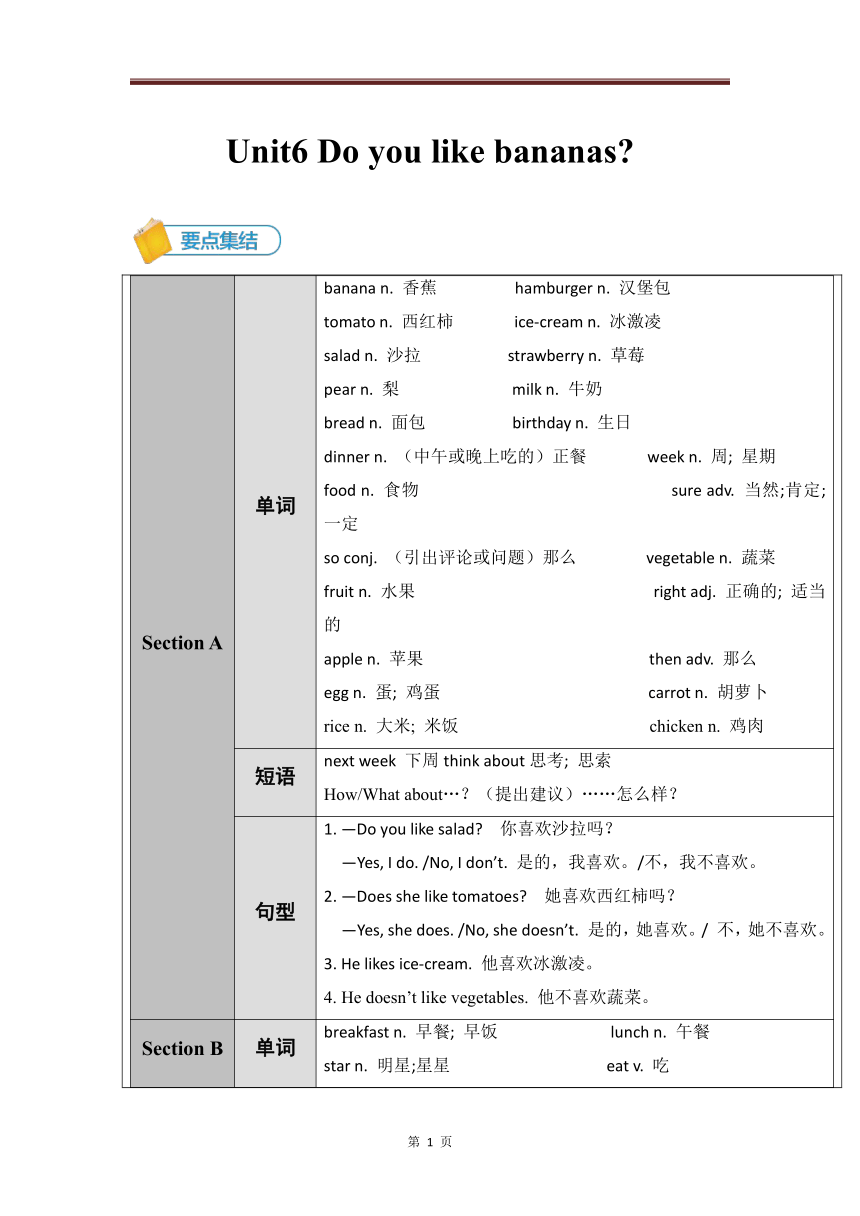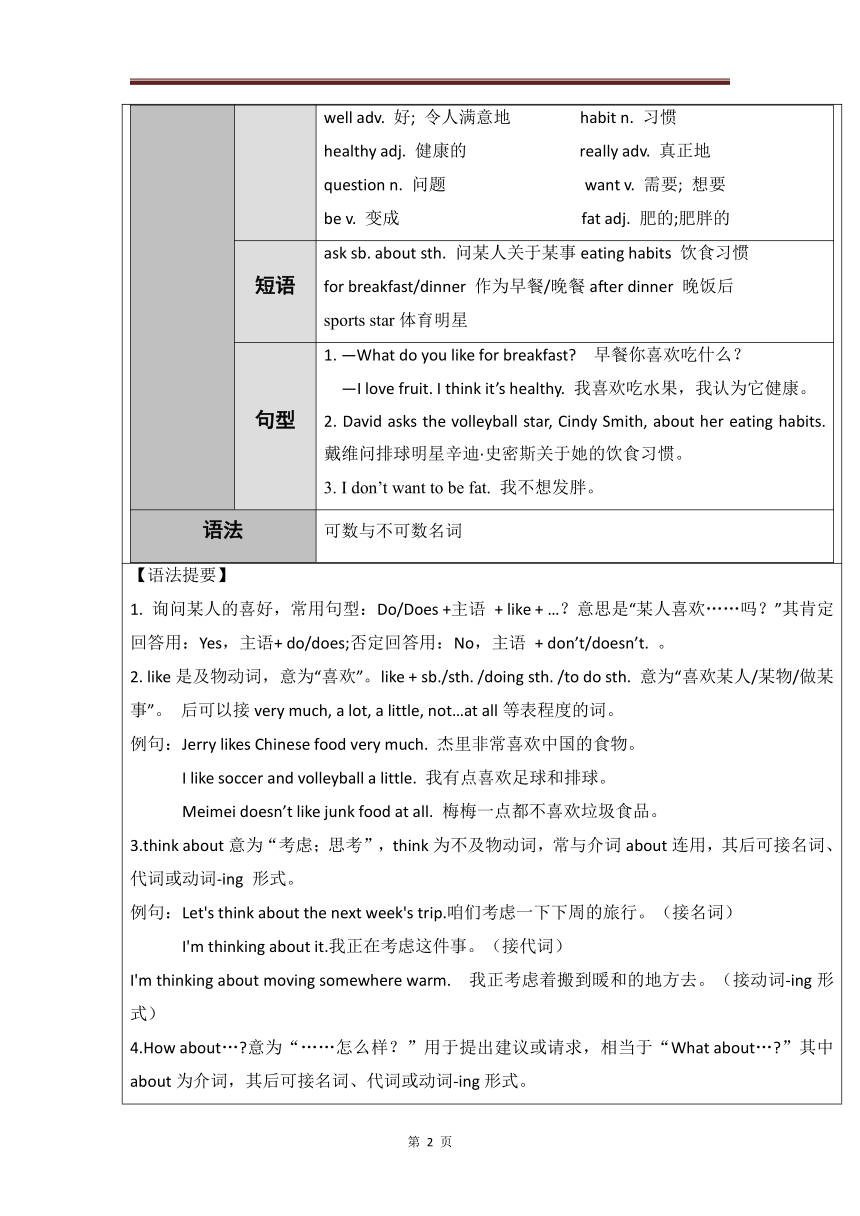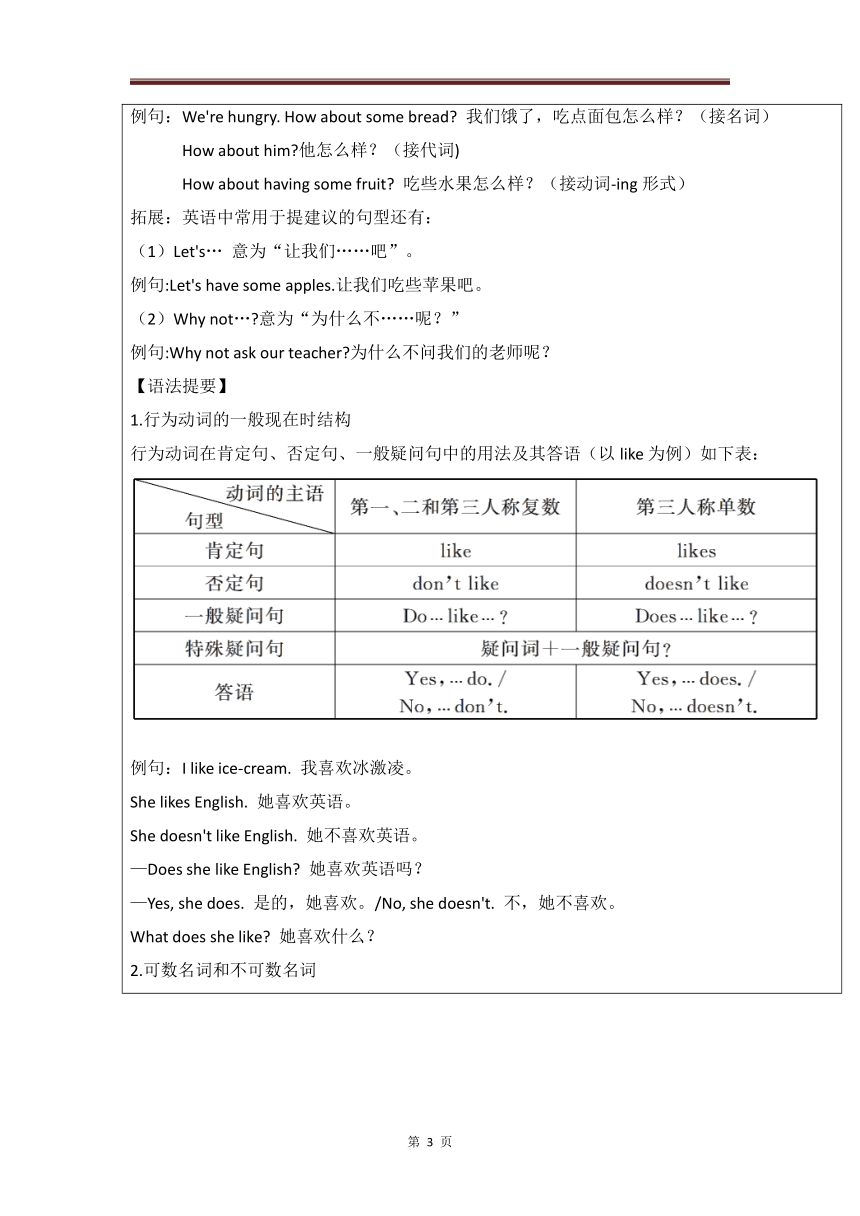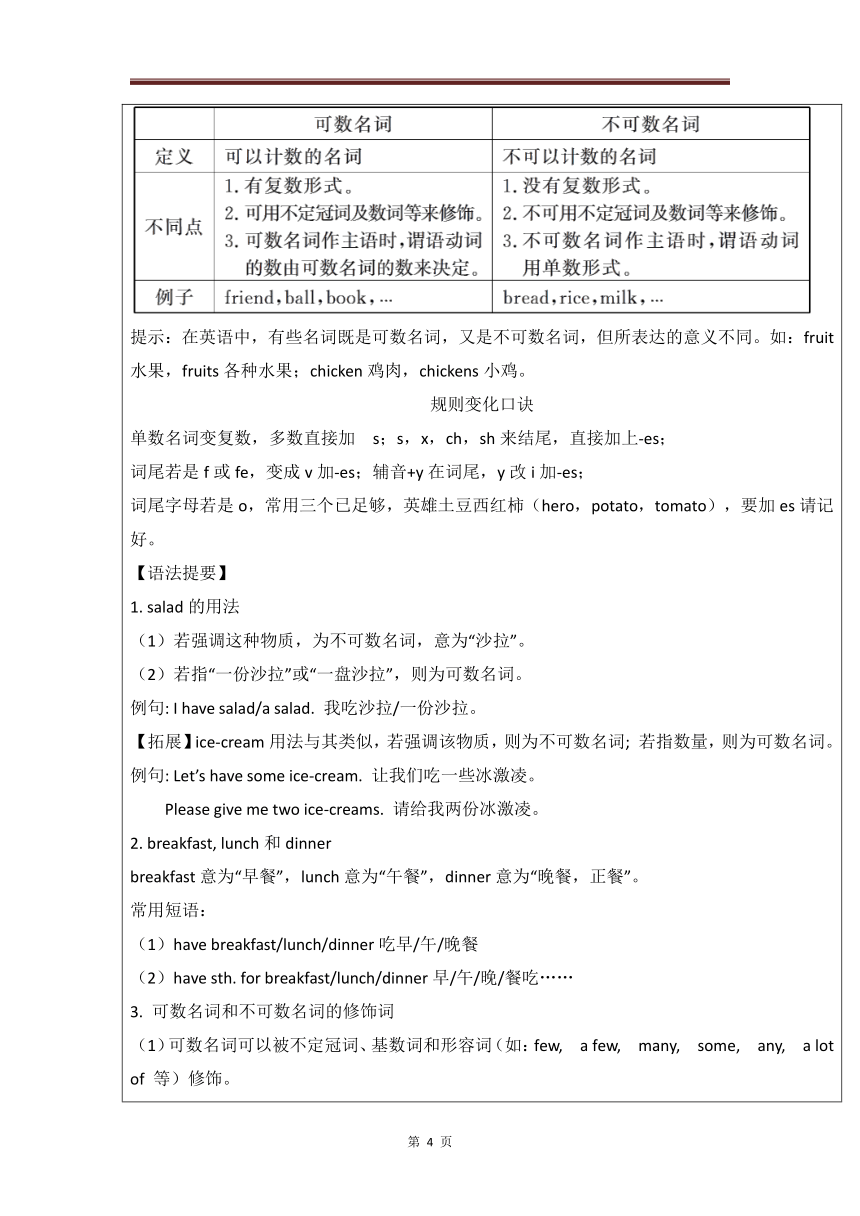Unit 6 Do you like bananas? 知识点归纳
文档属性
| 名称 | Unit 6 Do you like bananas? 知识点归纳 |

|
|
| 格式 | docx | ||
| 文件大小 | 136.2KB | ||
| 资源类型 | 教案 | ||
| 版本资源 | 人教新目标(Go for it)版 | ||
| 科目 | 英语 | ||
| 更新时间 | 2021-09-07 22:04:24 | ||
图片预览




文档简介
Unit6
Do
you
like
bananas?
Section
A单词banana
n.
香蕉
hamburger
n.
汉堡包
tomato
n.
西红柿
ice-cream
n.
冰激凌
salad
n.
沙拉
strawberry
n.
草莓
pear
n.
梨
milk
n.
牛奶
bread
n.
面包
birthday
n.
生日
dinner
n.
(中午或晚上吃的)正餐
week
n.
周;
星期
food
n.
食物
sure
adv.
当然;肯定;
一定
so
conj.
(引出评论或问题)那么
vegetable
n.
蔬菜
fruit
n.
水果
right
adj.
正确的;
适当的
apple
n.
苹果
then
adv.
那么
egg
n.
蛋;
鸡蛋
carrot
n.
胡萝卜
rice
n.
大米;
米饭
chicken
n.
鸡肉短语next
week
下周think
about思考;
思索
How/What
about…?(提出建议)……怎么样?句型1.
—Do
you
like
salad?
你喜欢沙拉吗?
—Yes,
I
do.
/No,
I
don’t.
是的,我喜欢。/不,我不喜欢。
2.
—Does
she
like
tomatoes?
她喜欢西红柿吗?
—Yes,
she
does.
/No,
she
doesn’t.
是的,她喜欢。/
不,她不喜欢。
3.
He
likes
ice-cream.
他喜欢冰激凌。
4.
He
doesn’t
like
vegetables.
他不喜欢蔬菜。Section
B单词breakfast
n.
早餐;
早饭
lunch
n.
午餐
star
n.
明星;星星
eat
v.
吃
well
adv.
好;
令人满意地
habit
n.
习惯
healthy
adj.
健康的
really
adv.
真正地
question
n.
问题
want
v.
需要;
想要
be
v.
变成
fat
adj.
肥的;肥胖的短语ask
sb.
about
sth.
问某人关于某事eating
habits
饮食习惯
for
breakfast/dinner
作为早餐/晚餐after
dinner
晚饭后
sports
star体育明星句型1.
—What
do
you
like
for
breakfast?
早餐你喜欢吃什么?
—I
love
fruit.
I
think
it’s
healthy.
我喜欢吃水果,我认为它健康。
2.
David
asks
the
volleyball
star,
Cindy
Smith,
about
her
eating
habits.
戴维问排球明星辛迪·史密斯关于她的饮食习惯。
3.
I
don’t
want
to
be
fat.
我不想发胖。语法可数与不可数名词
【语法提要】
1.
询问某人的喜好,常用句型:Do/Does
+主语
+
like
+
…?意思是“某人喜欢……吗?”其肯定回答用:Yes,主语+
do/does;否定回答用:No,主语
+
don’t/doesn’t.
。
2.
like是及物动词,意为“喜欢”。like
+
sb./sth.
/doing
sth.
/to
do
sth.
意为“喜欢某人/某物/做某事”。
后可以接very
much,
a
lot,
a
little,
not…at
all等表程度的词。
例句:Jerry
likes
Chinese
food
very
much.
杰里非常喜欢中国的食物。
I
like
soccer
and
volleyball
a
little.
我有点喜欢足球和排球。
Meimei
doesn’t
like
junk
food
at
all.
梅梅一点都不喜欢垃圾食品。
3.think
about意为“考虑;思考”,think为不及物动词,常与介词about连用,其后可接名词、代词或动词-ing
形式。
例句:Let's
think
about
the
next
week's
trip.咱们考虑一下下周的旅行。(接名词)
I'm
thinking
about
it.我正在考虑这件事。(接代词)
I'm
thinking
about
moving
somewhere
warm.
我正考虑着搬到暖和的地方去。(接动词-ing形式)
4.How
about…?意为“……怎么样?”用于提出建议或请求,相当于“What
about…?”其中about为介词,其后可接名词、代词或动词-ing形式。
例句:We're
hungry.
How
about
some
bread?
我们饿了,吃点面包怎么样?(接名词)
How
about
him?他怎么样?(接代词)
How
about
having
some
fruit?
吃些水果怎么样?(接动词-ing形式)
拓展:英语中常用于提建议的句型还有:
(1)Let's…
意为“让我们……吧”。
例句:Let's
have
some
apples.让我们吃些苹果吧。
(2)Why
not…?意为“为什么不……呢?”
例句:Why
not
ask
our
teacher?为什么不问我们的老师呢?
【语法提要】
1.行为动词的一般现在时结构
行为动词在肯定句、否定句、一般疑问句中的用法及其答语(以like为例)如下表:
?
例句:I
like
ice-cream.
我喜欢冰激凌。
She
likes
English.
她喜欢英语。
She
doesn't
like
English.
她不喜欢英语。
—Does
she
like
English?
她喜欢英语吗?
—Yes,
she
does.
是的,她喜欢。/No,
she
doesn't.
不,她不喜欢。
What
does
she
like?
她喜欢什么?
2.可数名词和不可数名词
提示:在英语中,有些名词既是可数名词,又是不可数名词,但所表达的意义不同。如:fruit水果,fruits各种水果;chicken鸡肉,chickens小鸡。
规则变化口诀
单数名词变复数,多数直接加?s;s,x,ch,sh来结尾,直接加上-es;
词尾若是f或fe,变成v加-es;辅音+y在词尾,y改i加-es;
词尾字母若是o,常用三个已足够,英雄土豆西红柿(hero,potato,tomato),要加es请记好。
【语法提要】
1.
salad的用法
(1)若强调这种物质,为不可数名词,意为“沙拉”。
(2)若指“一份沙拉”或“一盘沙拉”,则为可数名词。
例句:
I
have
salad/a
salad.
我吃沙拉/一份沙拉。
【拓展】ice-cream用法与其类似,若强调该物质,则为不可数名词;
若指数量,则为可数名词。
例句:
Let’s
have
some
ice-cream.
让我们吃一些冰激凌。
Please
give
me
two
ice-creams.
请给我两份冰激凌。
2.
breakfast,
lunch和dinner
breakfast意为“早餐”,lunch意为“午餐”,dinner意为“晚餐,正餐”。
常用短语:
(1)have
breakfast/lunch/dinner吃早/午/晚餐
(2)have
sth.
for
breakfast/lunch/dinner早/午/晚/餐吃……
3.
可数名词和不可数名词的修饰词
(1)可数名词可以被不定冠词、基数词和形容词(如:few,
a
few,
many,
some,
any,
a
lot
of
等)修饰。
(2)不可数名词不能用冠词a,
an及指示代词修饰,
不能用基数词修饰。可以用some,
any,
a
little,
much,
a
lot
of等修饰。
【语法提要】
1.
Sports
Star
Eats
Well!体育明星吃得好!
(1)star为可数名词,此处意为“明星”。也可作“星星”讲。
例句:She
is
a
movie
star.
她是一位电影明星。
(2)sports
star是名词短语,意为“体育明星,运动明星”。sports作定语修饰名词时,常用复数形式。
例如:sports
shoes
运动鞋sports
field
运动场
sports
meeting
运动会
(3)eat是动词,意为“吃”。其后接具体的食物名称。通常也可以用have
表示“吃(一日三餐);
喝”。
例句:
I
usually
have
breakfast
at
home.
我通常在家吃早餐。
I
have
some
rice,
chicken
and
vegetable
soup
for
lunch.
我午餐吃米饭、鸡肉,喝蔬菜汤。
(4)well是副词,意为“好”。用于实义动词后,表示“……得好”。
例句:
Do
you
think
he
sings
well?
你认为他唱得好吗?
辨析:
well与good
well作形容词,
位于连系动词后作表语,意为“健康的”。作副词,位于实义动词后作状语,意为“好”。We
are
all
well.
我们都很健康。
He
dances
well.
他舞跳得好。good作形容词,位于连系动词后作表语或名词前作定语,意为“好的”。The
food
is
good.
这食物很好。
She’s
a
good
girl.
她是个好女孩。
2.
What
do
you
like
for
breakfast?
你早餐喜欢吃什么?
(1)“What
do/does
+
主语
+
like
for
+
某餐?”用于询问某人某餐喜欢吃什么。
例句:
—What
do
you
like
for
breakfast?
你早餐喜欢吃什么?
—I
like
eggs
for
breakfast.
我早餐喜欢吃鸡蛋。
(2)介词for与一日三餐名称搭配使用时,表示各餐喜欢吃的食物。
例句:
I
like
fish
for
lunch.
我午餐喜欢吃鱼。
拓展:关于breakfast的常用短语有:
at
breakfast
在吃早饭时before
breakfast
早餐前
after
breakfast
早餐后
3.
I
don’t
want
to
be
fat.
我可不想变胖。
(1)want
to
be…意为“想要变得……;
想要成为……”,动词be之后接形容词或名词。
例句:She
doesn’t
want
to
be
a
teacher.
她不想成为一名教师。
拓展:want作及物动词,意为“需要;
想要”。其常见用法如下:
①want
sth.
想要某物
例句:
I
want
a
map.
我想要一张地图。
②want
to
do
sth.
想做某事
例句:
The
girl
wants
to
go
home.
那女孩想回家。
③want
sb.
(not)
to
do
sth.
想要某人(不)做某事
例句:
I
want
you
not
to
go
with
him.
我不想让你跟他一起去。
(2)be为连系动词,此处意为“变成”,其后常接形容词或名词作表语。
例句:We
want
to
be
friends.
我们想成为朋友。
(3)fat作形容词,意为“肥的;
肥胖的”。在英语中,
人们比较少使用fat这个词,而是委婉地改用其他说法。“I
don’t
want
to
be
fat.
”也可用“I
don’t
want
to
be
overweight(超重).
”来表达。
例句:She
is
fat,
but
I’m
thin.
她胖,但是我瘦。
1.
John
’s
birthday
dinner约翰的生日餐2.
vegetable
salad蔬菜沙拉3.
two
tomatoes两个西红柿4.
eat
well吃得好5.
think
about考虑6.
have
breakfast/lunch/dinner吃早餐/午餐/晚餐7.
a
sports
star
体育明星8.
a
volleyball
star一个排球明星9.
ask
sb.
about
sth.询问某人关于某事10.
like
hamburgers喜欢汉堡11.
like
eating
eggs喜欢吃鸡蛋12.
her
eating
habits她的饮食习惯13.
healthy
food健康的食物14.
one
last
question最后一个问题15.
next
week下一周16.
how
about/what
about。。。怎么样17.
my
eating
habit我的饮食习惯18.
want
to
do想要去做。。19.
be
fat变胖20.
play
basketball
well篮球打得好
21.ask
questions问问题
22
answer
questions回答问题二.重点句型Do
they
like
pears?他们喜欢梨吗?I
like
hamburgers.我喜欢汉堡包。She
likes
ice
cream.
她喜欢冰淇淋Does
she
like
ice
cream?
她喜欢冰淇淋吗?6.---He
has
chicken
and
rice
for
lunch.午餐他要吃鸡肉和米饭。7.What
do
you
like
for
dinner?晚餐你喜欢吃什么?8
.I
also
like
strawberries.=I
like
strawberries,
too.
我也喜欢草莓。.9
What
fruit
do
you
like?你喜欢什么水果10.
She
doesn’t
like
hamburgers
or
chicken.
她不喜欢汉堡和鸡肉11.
How/What
about
some
fruit?水果呢?12.
I
love
fruit.
I
think
it’s
healthy.
我喜欢水果。我想它是健康的,13.I
don’t
want
to
be
fat.
我不想变胖。14.
Let’s
have
apples
and
milk
then.
让我们吃苹果、喝牛奶吧。
Do
you
like
bananas?
Section
A单词banana
n.
香蕉
hamburger
n.
汉堡包
tomato
n.
西红柿
ice-cream
n.
冰激凌
salad
n.
沙拉
strawberry
n.
草莓
pear
n.
梨
milk
n.
牛奶
bread
n.
面包
birthday
n.
生日
dinner
n.
(中午或晚上吃的)正餐
week
n.
周;
星期
food
n.
食物
sure
adv.
当然;肯定;
一定
so
conj.
(引出评论或问题)那么
vegetable
n.
蔬菜
fruit
n.
水果
right
adj.
正确的;
适当的
apple
n.
苹果
then
adv.
那么
egg
n.
蛋;
鸡蛋
carrot
n.
胡萝卜
rice
n.
大米;
米饭
chicken
n.
鸡肉短语next
week
下周think
about思考;
思索
How/What
about…?(提出建议)……怎么样?句型1.
—Do
you
like
salad?
你喜欢沙拉吗?
—Yes,
I
do.
/No,
I
don’t.
是的,我喜欢。/不,我不喜欢。
2.
—Does
she
like
tomatoes?
她喜欢西红柿吗?
—Yes,
she
does.
/No,
she
doesn’t.
是的,她喜欢。/
不,她不喜欢。
3.
He
likes
ice-cream.
他喜欢冰激凌。
4.
He
doesn’t
like
vegetables.
他不喜欢蔬菜。Section
B单词breakfast
n.
早餐;
早饭
lunch
n.
午餐
star
n.
明星;星星
eat
v.
吃
well
adv.
好;
令人满意地
habit
n.
习惯
healthy
adj.
健康的
really
adv.
真正地
question
n.
问题
want
v.
需要;
想要
be
v.
变成
fat
adj.
肥的;肥胖的短语ask
sb.
about
sth.
问某人关于某事eating
habits
饮食习惯
for
breakfast/dinner
作为早餐/晚餐after
dinner
晚饭后
sports
star体育明星句型1.
—What
do
you
like
for
breakfast?
早餐你喜欢吃什么?
—I
love
fruit.
I
think
it’s
healthy.
我喜欢吃水果,我认为它健康。
2.
David
asks
the
volleyball
star,
Cindy
Smith,
about
her
eating
habits.
戴维问排球明星辛迪·史密斯关于她的饮食习惯。
3.
I
don’t
want
to
be
fat.
我不想发胖。语法可数与不可数名词
【语法提要】
1.
询问某人的喜好,常用句型:Do/Does
+主语
+
like
+
…?意思是“某人喜欢……吗?”其肯定回答用:Yes,主语+
do/does;否定回答用:No,主语
+
don’t/doesn’t.
。
2.
like是及物动词,意为“喜欢”。like
+
sb./sth.
/doing
sth.
/to
do
sth.
意为“喜欢某人/某物/做某事”。
后可以接very
much,
a
lot,
a
little,
not…at
all等表程度的词。
例句:Jerry
likes
Chinese
food
very
much.
杰里非常喜欢中国的食物。
I
like
soccer
and
volleyball
a
little.
我有点喜欢足球和排球。
Meimei
doesn’t
like
junk
food
at
all.
梅梅一点都不喜欢垃圾食品。
3.think
about意为“考虑;思考”,think为不及物动词,常与介词about连用,其后可接名词、代词或动词-ing
形式。
例句:Let's
think
about
the
next
week's
trip.咱们考虑一下下周的旅行。(接名词)
I'm
thinking
about
it.我正在考虑这件事。(接代词)
I'm
thinking
about
moving
somewhere
warm.
我正考虑着搬到暖和的地方去。(接动词-ing形式)
4.How
about…?意为“……怎么样?”用于提出建议或请求,相当于“What
about…?”其中about为介词,其后可接名词、代词或动词-ing形式。
例句:We're
hungry.
How
about
some
bread?
我们饿了,吃点面包怎么样?(接名词)
How
about
him?他怎么样?(接代词)
How
about
having
some
fruit?
吃些水果怎么样?(接动词-ing形式)
拓展:英语中常用于提建议的句型还有:
(1)Let's…
意为“让我们……吧”。
例句:Let's
have
some
apples.让我们吃些苹果吧。
(2)Why
not…?意为“为什么不……呢?”
例句:Why
not
ask
our
teacher?为什么不问我们的老师呢?
【语法提要】
1.行为动词的一般现在时结构
行为动词在肯定句、否定句、一般疑问句中的用法及其答语(以like为例)如下表:
?
例句:I
like
ice-cream.
我喜欢冰激凌。
She
likes
English.
她喜欢英语。
She
doesn't
like
English.
她不喜欢英语。
—Does
she
like
English?
她喜欢英语吗?
—Yes,
she
does.
是的,她喜欢。/No,
she
doesn't.
不,她不喜欢。
What
does
she
like?
她喜欢什么?
2.可数名词和不可数名词
提示:在英语中,有些名词既是可数名词,又是不可数名词,但所表达的意义不同。如:fruit水果,fruits各种水果;chicken鸡肉,chickens小鸡。
规则变化口诀
单数名词变复数,多数直接加?s;s,x,ch,sh来结尾,直接加上-es;
词尾若是f或fe,变成v加-es;辅音+y在词尾,y改i加-es;
词尾字母若是o,常用三个已足够,英雄土豆西红柿(hero,potato,tomato),要加es请记好。
【语法提要】
1.
salad的用法
(1)若强调这种物质,为不可数名词,意为“沙拉”。
(2)若指“一份沙拉”或“一盘沙拉”,则为可数名词。
例句:
I
have
salad/a
salad.
我吃沙拉/一份沙拉。
【拓展】ice-cream用法与其类似,若强调该物质,则为不可数名词;
若指数量,则为可数名词。
例句:
Let’s
have
some
ice-cream.
让我们吃一些冰激凌。
Please
give
me
two
ice-creams.
请给我两份冰激凌。
2.
breakfast,
lunch和dinner
breakfast意为“早餐”,lunch意为“午餐”,dinner意为“晚餐,正餐”。
常用短语:
(1)have
breakfast/lunch/dinner吃早/午/晚餐
(2)have
sth.
for
breakfast/lunch/dinner早/午/晚/餐吃……
3.
可数名词和不可数名词的修饰词
(1)可数名词可以被不定冠词、基数词和形容词(如:few,
a
few,
many,
some,
any,
a
lot
of
等)修饰。
(2)不可数名词不能用冠词a,
an及指示代词修饰,
不能用基数词修饰。可以用some,
any,
a
little,
much,
a
lot
of等修饰。
【语法提要】
1.
Sports
Star
Eats
Well!体育明星吃得好!
(1)star为可数名词,此处意为“明星”。也可作“星星”讲。
例句:She
is
a
movie
star.
她是一位电影明星。
(2)sports
star是名词短语,意为“体育明星,运动明星”。sports作定语修饰名词时,常用复数形式。
例如:sports
shoes
运动鞋sports
field
运动场
sports
meeting
运动会
(3)eat是动词,意为“吃”。其后接具体的食物名称。通常也可以用have
表示“吃(一日三餐);
喝”。
例句:
I
usually
have
breakfast
at
home.
我通常在家吃早餐。
I
have
some
rice,
chicken
and
vegetable
soup
for
lunch.
我午餐吃米饭、鸡肉,喝蔬菜汤。
(4)well是副词,意为“好”。用于实义动词后,表示“……得好”。
例句:
Do
you
think
he
sings
well?
你认为他唱得好吗?
辨析:
well与good
well作形容词,
位于连系动词后作表语,意为“健康的”。作副词,位于实义动词后作状语,意为“好”。We
are
all
well.
我们都很健康。
He
dances
well.
他舞跳得好。good作形容词,位于连系动词后作表语或名词前作定语,意为“好的”。The
food
is
good.
这食物很好。
She’s
a
good
girl.
她是个好女孩。
2.
What
do
you
like
for
breakfast?
你早餐喜欢吃什么?
(1)“What
do/does
+
主语
+
like
for
+
某餐?”用于询问某人某餐喜欢吃什么。
例句:
—What
do
you
like
for
breakfast?
你早餐喜欢吃什么?
—I
like
eggs
for
breakfast.
我早餐喜欢吃鸡蛋。
(2)介词for与一日三餐名称搭配使用时,表示各餐喜欢吃的食物。
例句:
I
like
fish
for
lunch.
我午餐喜欢吃鱼。
拓展:关于breakfast的常用短语有:
at
breakfast
在吃早饭时before
breakfast
早餐前
after
breakfast
早餐后
3.
I
don’t
want
to
be
fat.
我可不想变胖。
(1)want
to
be…意为“想要变得……;
想要成为……”,动词be之后接形容词或名词。
例句:She
doesn’t
want
to
be
a
teacher.
她不想成为一名教师。
拓展:want作及物动词,意为“需要;
想要”。其常见用法如下:
①want
sth.
想要某物
例句:
I
want
a
map.
我想要一张地图。
②want
to
do
sth.
想做某事
例句:
The
girl
wants
to
go
home.
那女孩想回家。
③want
sb.
(not)
to
do
sth.
想要某人(不)做某事
例句:
I
want
you
not
to
go
with
him.
我不想让你跟他一起去。
(2)be为连系动词,此处意为“变成”,其后常接形容词或名词作表语。
例句:We
want
to
be
friends.
我们想成为朋友。
(3)fat作形容词,意为“肥的;
肥胖的”。在英语中,
人们比较少使用fat这个词,而是委婉地改用其他说法。“I
don’t
want
to
be
fat.
”也可用“I
don’t
want
to
be
overweight(超重).
”来表达。
例句:She
is
fat,
but
I’m
thin.
她胖,但是我瘦。
1.
John
’s
birthday
dinner约翰的生日餐2.
vegetable
salad蔬菜沙拉3.
two
tomatoes两个西红柿4.
eat
well吃得好5.
think
about考虑6.
have
breakfast/lunch/dinner吃早餐/午餐/晚餐7.
a
sports
star
体育明星8.
a
volleyball
star一个排球明星9.
ask
sb.
about
sth.询问某人关于某事10.
like
hamburgers喜欢汉堡11.
like
eating
eggs喜欢吃鸡蛋12.
her
eating
habits她的饮食习惯13.
healthy
food健康的食物14.
one
last
question最后一个问题15.
next
week下一周16.
how
about/what
about。。。怎么样17.
my
eating
habit我的饮食习惯18.
want
to
do想要去做。。19.
be
fat变胖20.
play
basketball
well篮球打得好
21.ask
questions问问题
22
answer
questions回答问题二.重点句型Do
they
like
pears?他们喜欢梨吗?I
like
hamburgers.我喜欢汉堡包。She
likes
ice
cream.
她喜欢冰淇淋Does
she
like
ice
cream?
她喜欢冰淇淋吗?6.---He
has
chicken
and
rice
for
lunch.午餐他要吃鸡肉和米饭。7.What
do
you
like
for
dinner?晚餐你喜欢吃什么?8
.I
also
like
strawberries.=I
like
strawberries,
too.
我也喜欢草莓。.9
What
fruit
do
you
like?你喜欢什么水果10.
She
doesn’t
like
hamburgers
or
chicken.
她不喜欢汉堡和鸡肉11.
How/What
about
some
fruit?水果呢?12.
I
love
fruit.
I
think
it’s
healthy.
我喜欢水果。我想它是健康的,13.I
don’t
want
to
be
fat.
我不想变胖。14.
Let’s
have
apples
and
milk
then.
让我们吃苹果、喝牛奶吧。
同课章节目录
- starters 预备篇(2012秋审查)
- Unit 1 Good morning !
- Unit 2 What’s this in English?
- Unit 3 What color is it ?
- Unit 1 My name's Gina.
- Section A
- Section B
- Unit 2 This is my sister.
- Section A
- Section B
- Unit 3 Is this your pencil?
- Section A
- Section B
- Unit 4 Where's my schoolbag?
- Section A
- Section B
- Unit 5 Do you have a soccer ball?
- Section A
- Section B
- Unit 6 Do you like bananas?
- Section A
- Section B
- Unit 7 How much are these socks?
- Section A
- Section B
- Unit 8 When is your birthday?
- Section A
- Section B
- Unit 9 My favorite subject is science.
- Section A
- Section B
